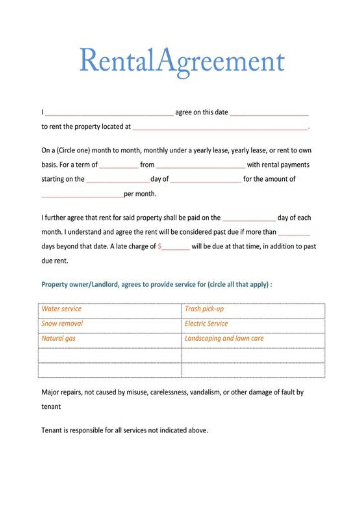Many Indians still opt to rent houses even though they hope to own their own homes one day. In the eyes of some, a house for rent serves as a temporary solution until they become homeowners.
The government's aim of delivering housing for all by 2022 looks unlikely. It may have been possible to accomplish this electoral promise by building enough rental housing and backing it with a sound rental housing policy.
The discussion stage on this front has also seen little progress. Despite the fact that many Indians dream of owning their own homes one day, renting is still the most common option.
Until the dream of homeownership is realized, some people view rental housing as a temporary measure. Some people see it as a more or less permanent lifestyle choice.
House for Rent is an important part of Indian life. Rental housing is just like homeownership: finding and securing the 'perfect fit' is not an easy task.
While Choosing A House For Rent, There Are Some Points You Need To Consider:
1. Setting the Right Price

Image source : Pinterest
While looking for a house for rent, one major consideration is how much money one should spend on it? In general, tenants shouldn't spend more than 25%-30% of their income on rent.
The one-time deposit is hefty since one needs to pay for the one-time deposit, maintenance costs, water and electricity bills, and some additional fees.
One must also pay a month's rent as a brokerage if one has used an agent to locate the property.
A person's budget needs to be sifted through in order to select properties in the best locations within one's budget.
2. Detailed Research

Image source : Pinterest
Technology-savvy people assume that the ability to browse rental properties online makes the rental housing hunt much less stressful.
There are many realty portals online that list available rental properties in a given region. Many are listed by brokers, but some are directly posted by owners.
Experiencing a rental search exclusively online poses several problems.
Social media, such as WhatsApp or Facebook groups, have become an informal and popular way to find a rental home.
To avoid broker fees, owners post their listings to the WhatsApp group of the housing society, from which they percolate down to a larger community of tenants.
3. Accessibility Factors

Image source : Pinterest
Renting versus owning a home has the advantage of giving one a wide range of options and allowing one to move if one place does not turn out as expected.
Following the finalization of a budget, rental properties must be shortlisted based on their proximity to either the workplace or children's schools - preferably both.
The result is a better work-life balance as commute expenses and time are reduced.
Easy access to private and public transportation must be considered if the selected area is a city suburb.
As an alternative, one may prefer to live close to their employer where rents may be higher.
Providing you are capable of adjusting the commute expenses from a distant locality with the higher rent in a closer location, this is an option.
4. Checking Out Rental Properties

Image source : Pinterest
It is imperative that you visit the shortlisted properties directly after the search has been completed.
External factors that should be considered include whether daily-needs shops, entertainment options, hospitals, and other useful social facilities are convenient.
The absence of these facilities can create problems for families.
The property itself must be inspected for its ventilation, its illumination, its water supply, its electrical fittings, its stains, its electric and water supply, etc.
If these vital aspects are in order, the property itself needs to be inspected for damages including seepage, stains on walls, and electrical and bathroom fittings.
Ideally, the property should be damage-free.
5. Rental Agreements

Image source : Pinterest
Renting the right property and living in the aspired-for comfort and assurance can ultimately be achieved by securing the right rental agreement.
Legally speaking, one should carefully review the rental agreement details after negotiating the price.
Termination clauses, contract dates, penalties, repair costs, visitor limits, renewing, and escalating rent are some of the things to look out for.
The cost of renting a home goes beyond just the monthly rent from a financial planning perspective.
6. Expenses Of Renting A House

Image source : Pinterest
A lump-sum deposit is required, as well as the monthly rental, plus the monthly utilities. Rental agreements should specify these and be discussed with the landlord.
A monthly fee may also apply when using the clubhouse facilities in some housing societies.
Taking advantage of smart home features like CCTV, intercom facilities, and other security options can cost extra in some premium communities.
It is likely that the housing society will charge a one-time fee if the property needs exterior or internal repairs. It is the landlord's responsibility whether the tenant or he/she pays this portion.
7. Pet Policy

Image source : Pinterest
You might have to leave your pet behind or rehome your pet if your landlord has a strict no pets policy, so make sure to check with them before you move in.
In some cases, building societies enforce the No Pet policy rather than the owners. Consult the rules of the building or society if the owner is unclear about the policy.
Questions To Ask Your Landlord Before You Rent A House in India
1. What Is The Rent Due Date? How Often Is It Increased?
Set a mutually convenient date for rent payment, as well as a method of payment (cheques/NEFT). Set a grace period.
Most landlords allow a grace period of 7-10 days from the due date. Rental rates typically increase by 5-10% after one year.
2. Are There Any Rules For Guests/Visitors?
In many cases, single tenants are forbidden by society to invite guests overnight, while others may not be allowed to hold get-togethers after hours. Check with your landlord to see if such restrictions apply.
3. Are There Any Amenities At The Property?
Ask if tenants can use any on-premises facilities, such as a gym, pool, sports complex, etc. In that case, inform yourself about the rules, charges, restrictions, and timings of use.
4. Is The Amount Of The Security Deposit Fair?
Rental security deposits are not regulated by law. The landlord usually requires a deposit of two to six months' rent, depending on the location. Rent over six months must be negotiated with the landlord.
5. Is The Utility Bill Paid?
Be sure the landlord pays any outstanding light, gas, or water bills from prior tenants. A landlord must pay a monthly bill even if the house has been unoccupied.
Conclusion
Most of the time, confusion arises from a lack of awareness. Find out what kind of person your landlord is when you talk with him. Observe his behavior for signs of trouble.
Look to see if he's the kind of person who nits-picks, is too inquisitive, or drops by a lot.
In that case, it would be a bad idea to move into his home while you are there. Even if you get an excellent landlord, your neighbors may be nosy or noisy! Keep an eye out for these two factors.
Prior to negotiating the price and other issues with a landlord, a prospective tenant needs to do thorough research. The only way to ensure safety and viability is to have a written agreement that lists all pertinent information.
Eventually, landlords and tenants may become close friends, but in the beginning, they should be treated as pure business partners. Consequently, all agreements must be in writing and registered.







